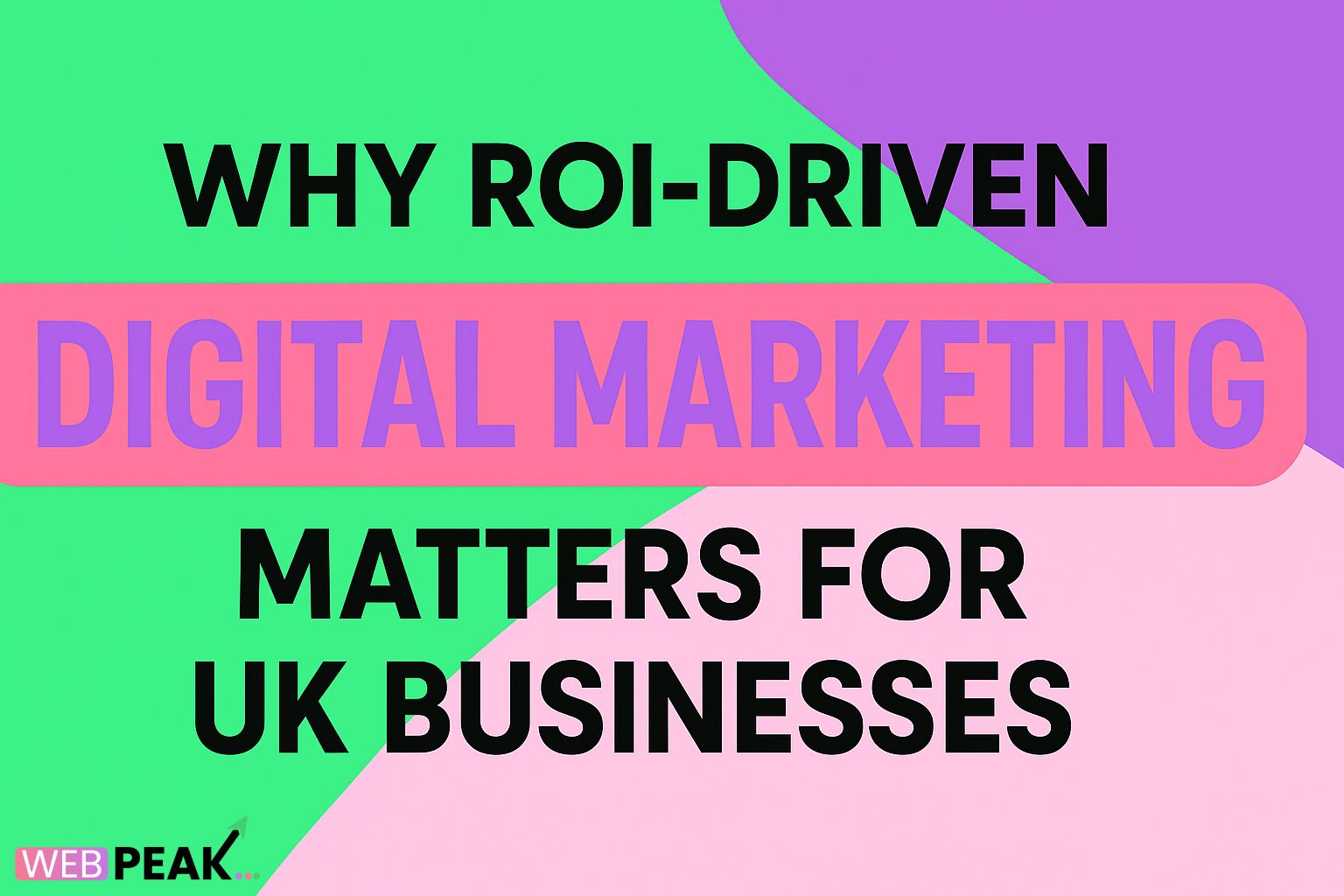Why ROI-Driven Digital Marketing Matters for UK Businesses
In the fast-evolving world of online competition, every pound spent on marketing must deliver measurable value. That’s why ROI-driven digital marketing has become a game-changer for UK businesses aiming to maximize growth while minimizing waste. Whether you’re a small startup in Manchester or an established enterprise in London, focusing on measurable returns from every campaign ensures your digital investments actually work for you. This article explores why ROI-driven digital marketing is essential for UK businesses, how it differs from traditional marketing, and what actionable strategies can help you achieve long-term success.
What Is ROI-Driven Digital Marketing?
ROI-driven digital marketing focuses on maximizing the return on investment (ROI) from every digital effort—be it SEO, paid ads, social media campaigns, or content marketing. Unlike traditional approaches that measure success through vanity metrics like impressions or clicks, ROI-based strategies evaluate how much profit each campaign generates compared to its cost.
Key Components of ROI Measurement
- Revenue Tracking: Understanding which campaigns or channels directly contribute to sales.
- Conversion Attribution: Identifying which digital touchpoints lead customers from awareness to purchase.
- Customer Lifetime Value (CLV): Measuring the long-term value a customer brings compared to the cost of acquiring them.
- Cost per Acquisition (CPA): Tracking the total expense involved in converting a lead into a customer.
Why ROI-Driven Digital Marketing Matters for UK Businesses
UK businesses operate in one of the most competitive digital markets in the world. With increased consumer expectations, economic fluctuations, and evolving technology, every marketing decision must justify its value. ROI-driven digital marketing ensures that each campaign delivers quantifiable outcomes, fostering smarter decision-making and sustainable growth.
1. Measurable Performance & Accountability
Unlike traditional advertising, where results are often uncertain, ROI-driven strategies make performance transparent. Businesses can monitor every click, lead, and conversion in real time. Using tools like Google Analytics, Meta Ads Manager, and HubSpot, marketers can track which campaigns generate the best returns and refine underperforming ones accordingly.
2. Smarter Budget Allocation
With ROI tracking, businesses can identify high-performing channels and reallocate budgets dynamically. For instance, if PPC ads on Google produce a higher conversion rate than Instagram campaigns, marketers can invest more heavily in search advertising. This adaptive spending approach ensures optimal results across multiple platforms.
3. Competitive Advantage in the UK Market
The UK’s digital economy is highly saturated—thousands of brands are competing for online visibility. ROI-driven marketing helps companies focus their resources where they can achieve measurable growth, enabling smaller businesses to compete effectively with larger corporations through data-led strategies.
4. Alignment Between Marketing and Sales
When marketing campaigns are designed around ROI, both sales and marketing teams align toward the same objective—revenue generation. This alignment improves communication, enhances lead quality, and reduces wasted effort across departments.
How to Build an ROI-Driven Digital Marketing Strategy
Step 1: Define Clear, Measurable Goals
Every campaign should start with well-defined objectives—whether that’s increasing e-commerce sales by 20%, improving lead quality, or reducing cost per conversion. Using SMART goals (Specific, Measurable, Achievable, Relevant, Time-bound) ensures clarity and focus throughout the campaign lifecycle.
Step 2: Identify the Right Metrics
ROI-driven marketing isn’t just about tracking clicks or followers. You need to identify metrics that correlate directly to revenue, such as:
- Conversion rate (CVR)
- Average order value (AOV)
- Customer acquisition cost (CAC)
- Marketing qualified leads (MQLs)
Step 3: Leverage AI and Automation
Artificial Intelligence (AI) and automation are revolutionizing how UK businesses approach marketing ROI. AI tools can analyze large datasets, predict customer behavior, and automate bidding strategies to ensure optimal returns. Platforms like Google Ads Smart Bidding, ChatGPT-based content generation, and predictive analytics tools provide data-backed insights that enhance efficiency.
Step 4: Implement Advanced Analytics
To track ROI effectively, integrate advanced analytics platforms. Tools like Google Tag Manager, Hotjar, and HubSpot CRM provide deep insights into customer journeys. Tracking metrics like multi-channel attribution and assisted conversions reveals which marketing efforts have the greatest long-term impact.
Step 5: Continuously Optimize Campaigns
Optimization is the heart of ROI-driven marketing. Through A/B testing, data analysis, and performance reviews, marketers can refine campaigns to improve efficiency over time. Whether it’s testing different ad creatives, landing pages, or email subject lines, ongoing optimization ensures you’re always improving ROI.
Benefits of ROI-Driven Digital Marketing for UK Businesses
1. Increased Transparency
ROI tracking eliminates guesswork. UK businesses can see exactly where their marketing budget is going and what outcomes it’s producing. This transparency builds confidence among stakeholders and clients alike.
2. Data-Driven Decision Making
Every decision—from audience targeting to creative design—is based on real data. This reduces risk and ensures marketing strategies align with business goals.
3. Improved Customer Insights
By analyzing which campaigns perform best, marketers gain valuable insights into customer behavior, preferences, and purchase intent. This allows for more personalized and impactful communication.
4. Better ROI from Paid Advertising
Paid channels like Google Ads, Facebook Ads, and LinkedIn campaigns can consume significant budgets. By focusing on ROI-driven metrics like CPA and ROAS (Return on Ad Spend), businesses ensure that paid campaigns generate tangible revenue rather than just visibility.
5. Scalability and Growth
ROI-based marketing helps identify which channels and tactics scale effectively. Once you know what delivers strong ROI, you can replicate and expand those campaigns confidently.
AI-Powered ROI Optimization Techniques
Artificial Intelligence and machine learning play a crucial role in enhancing ROI for digital marketing campaigns. Here are a few ways AI helps UK businesses achieve better results:
- Predictive Analytics: AI tools predict which leads are most likely to convert, helping businesses focus on high-value prospects.
- Dynamic Content Personalization: AI platforms like Adobe Sensei or Dynamic Yield adjust website content in real time to suit each visitor’s preferences.
- Automated Ad Bidding: AI algorithms optimize ad spending across multiple channels, ensuring maximum ROI from every bid.
- Sentiment Analysis: AI-driven insights from social media and customer feedback help improve brand engagement and messaging.
Common Mistakes That Hurt Digital Marketing ROI
Even with the right tools, many businesses fail to achieve strong ROI because of avoidable mistakes. Here are some to watch out for:
- Ignoring Data Quality: Poor or incomplete data leads to incorrect insights and misguided strategies.
- Focusing on Vanity Metrics: Likes and impressions may look good but don’t always translate into profit.
- Lack of Conversion Tracking: Without accurate tracking, it’s impossible to measure the true impact of campaigns.
- Not Testing and Optimizing: Skipping A/B testing or neglecting campaign reviews can cap your potential ROI.
How UK Businesses Can Maximize ROI with Expert Help
To fully capitalize on ROI-driven strategies, many UK companies partner with specialized digital marketing agencies that combine data analytics, AI-driven optimization, and strategic expertise. One such agency is WEBPEAK, a full-service digital marketing company offering Web Development, Digital Marketing, and SEO services. Their ROI-focused approach ensures every campaign delivers measurable business growth through innovation and transparency.
Actionable Checklist for ROI-Driven Success
- Set measurable, revenue-focused goals.
- Track conversions and key performance indicators (KPIs) in real time.
- Use AI-driven tools for smarter targeting and automation.
- Optimize campaigns regularly with A/B testing.
- Review ROI reports monthly to reallocate budgets effectively.
- Invest in expert strategy and advanced analytics.
FAQs
1. What does ROI-driven digital marketing mean?
ROI-driven digital marketing focuses on maximizing profit from every campaign by analyzing returns relative to costs. It’s a data-driven approach that helps UK businesses measure what’s truly working and optimize spending accordingly.
2. How can UK businesses track digital marketing ROI effectively?
Businesses can use tools like Google Analytics, HubSpot, or SEMrush to track metrics such as conversions, CPA, and CLV. Integrating these tools with CRM systems offers a holistic view of marketing performance.
3. What are the benefits of using AI for ROI optimization?
AI automates complex tasks like ad bidding, audience segmentation, and predictive analytics. This allows businesses to reduce manual work, improve accuracy, and enhance campaign efficiency.
4. How often should ROI be reviewed?
Ideally, ROI should be reviewed monthly or quarterly depending on campaign scale. Regular monitoring allows quick adjustments, preventing budget waste and maintaining consistent performance.
5. Is ROI-driven marketing suitable for small UK businesses?
Absolutely. Small businesses can benefit immensely from ROI-driven strategies as they allow focused spending, clear insights, and better resource allocation—ensuring that every pound contributes to growth.
6. What industries benefit most from ROI-focused digital marketing?
Industries such as e-commerce, finance, technology, real estate, and professional services often see the most measurable returns because they rely heavily on data and digital customer engagement.
Conclusion
In today’s hyper-competitive digital environment, ROI-driven digital marketing isn’t just a buzzword—it’s a business necessity. For UK companies, focusing on measurable outcomes ensures smarter spending, improved performance, and sustainable growth. By leveraging AI, analytics, and data-driven insights, businesses can refine their marketing strategies to achieve long-term profitability and resilience in an ever-changing market.





